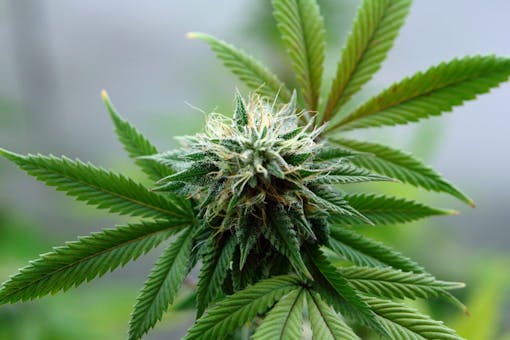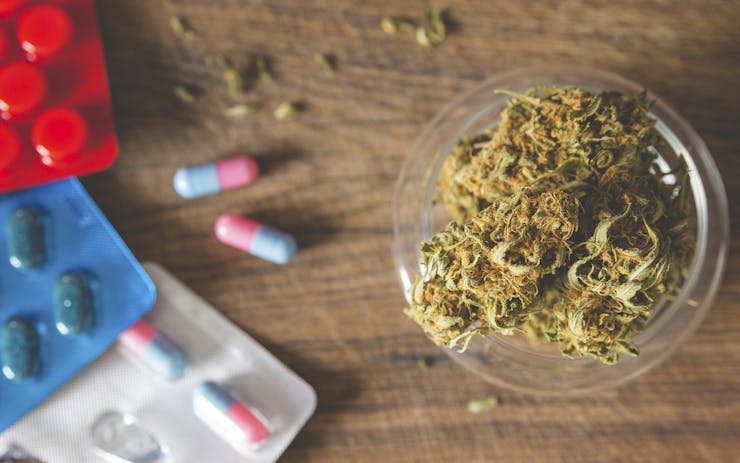Cannabis can make people feel more relaxed, less stressed, and, of course, happier. So predictably, people experiencing depression or anxiety are much more likely to use cannabis—and more of it—than people not suffering from these conditions.
Many people with these conditions also take prescription antidepressants like Zoloft, Prozac, and Wellbutrin while also consuming weed. Consequently, it’s important for medical professionals and patients to be educated on potential interactions that could arise by combining the two.
Remarkably, despite years of research investigating links between cannabis use and psychiatric disorders, few rigorous studies have been published that closely examine how cannabis and antidepressants may interact. Robust searches of Google Scholar and the National Institutes of Health PubMed website produce few relevant studies. Even the National Institute on Drug Abuse (NIDA) website carries very little information on this topic.
However, researchers from the Division of Child and Adolescent Psychiatry at the University of Connecticut Health Center conducted an extensive review of the limited scientific literature and published a report, Psychotropic Medications and Substances of Abuse Interactions in Youth. They noted—and I’m paraphrasing—that while one might presume combining psychoactive drugs and psychotropic medications would increase the chances of patients experiencing adverse effects, there have been (astonishingly) few reports documenting adverse effects arising from interactions between the two.
The University of Connecticut researchers explained why there may be so few reports: It’s possible adverse events are “relatively rare” or “do not happen.” Moreover, “newer psychotropic medications have a relatively high therapeutic index”—as a class of drugs, they are less likely to produce adverse interactions. However, they also noted that lack of recognition or awareness could be to blame, and patients experiencing adverse effects may resist disclosing their cannabis consumption for fear of stigmatization.
Nonetheless, it’s likely that newer antidepressants carry low to moderate risks when mixed with marijuana, while older antidepressants carry a higher risk. Characterizing the risk as “moderate,” RxList, an online index of drugs published by WebMD, advises patients who consume cannabis to “be cautious” and “talk with [their] health provider” when combining it with antidepressants.
Risks of cannabis and antidepressant drug interactions

One of the challenges facing physicians prescribing antidepressants to patients who also consume cannabis (or any other substance, for that matter) is prescribing the appropriate dose—co-occurring cannabis use can impede their ability to accurately assess the efficacy of antidepressants.
Shop highly rated dispensaries near you
Showing you dispensaries nearPhysicians note that one of the most significant variables when patients combine any sort of drug is the ability to measure to what degree each produces side effects and how the substances affect behavior and mood. Obviously, the more substances a patient is combining, the more difficult it is to isolate the effects of each. That’s why physicians often start a patient on one drug and add others later.
Allan Schwartz, LCSW, PhD, a psychotherapist and licensed clinical social worker in Colorado and New York, has found that (particularly in severe cases) patients should abstain from cannabis and other substances during treatment depression or anxiety—at least temporarily—that involves antidepressants.
“I was, at times, able to get patients to agree to stop their marijuana use for a few weeks just so they could determine whether there was or was not an improvement in mood,” said Schwartz. “These individuals were surprised, but were willing to admit that they felt real improvement in mood and functioning.”
There’s also evidence to suggest patients are more likely to misuse cannabis or transition from occasional to chronic use when they’re depressed. In fact, those suffering from anxiety or depression use cannabis at rates between two and eight times greater than those without these conditions.
Anecdotally, many physicians report that some patients who use cannabis, alcohol, or other drugs during treatment—particularly those with severe depression or bipolar disorder—are less likely to adhere to their treatment protocols, including prescription drugs and behavioral interventions, e.g. cognitive behavioral therapy, psychotherapy, etc.
Schwartz says he has seen patients go on and off medication, often with disastrous results. “I have directly witnessed the tragedy of patients going off of their medications for bipolar disorder, using marijuana and ending up re-hospitalized in worse shape than any time prior to the relapse,” said Schwartz. “In fact, it has been my experience that many of these unfortunate patients experienced multiple relapses and were caught in an endless cycle of hospitalizations marked by periods of instability in between.”

Sour Diesel THCA Flower
28.1% THCA | Chemdawg x Super Skunk
Arete’s Sour Diesel hemp THCA flower is a 90/10 sativa-dominant hybrid grown indoors with living soil. Expect dense green buds with a heavy frost and a classic, loud-diesel aroma. Effects are energetic, creative, and cerebral. Have it shipped to your door in US states that allow hemp flower products!
3.5g, 7g, 14g, and 28g
We may earn a small commission if you buy through links on this page. Availability subject to law.
Potential side effects of using cannabis with specific types of antidepressants
Beyond these generalized risks, each class of antidepressants is unique and associated with varying side effects and potential interactions. Based on a review of scientific literature, below is a summary of the most common classes of antidepressants and associated risks.
| Type of antidepressant | Prescription brand names | Potential cannabis interaction risk |
|---|---|---|
| Selective serotonin reuptake inhibitors (SSRIs) | Prozac, Paxil, Zoloft, Celexa, Lexapro, Sertraline | Low to moderate |
| Serotonin and norepinephrine reuptake inhibitors (SNRIs) | duloxetine (Cymbalta), venlafaxine (Effexor XR) | Low to moderate |
| Norepinephrine and dopamine reuptake inhibitors (NDRIs) | Wellbutrin, Aplenzin, Forfivo XL | Low to moderate |
| Monoamine oxidase inhibitors (MAOIs) | tranylcypromine (Parnate), phenelzine (Nardil), isocarboxazid (Marplan) | High |
| Tricyclic antidepressants | imipramine (Tofranil), amitriptyline, doxepin, trimipramine (Surmontil) | High |
| Sedatives | clonazepam (Klonopin), lorazepam (Ativan), phenobarbital (Donnatal), zolpidem (Ambien) | High |
Selective serotonin reuptake inhibitors (SSRIs)
Potential cannabis interaction risk: Low to moderate
SSRIs are the most commonly prescribed drugs to treat depression. Patients report fewer side effects and drug interactions with SSRIs than many other types of antidepressants.
Common SSRIs include:
- Prozac
- Paxil
- Zoloft
- Celexa
- Lexapro
- Sertraline
Adverse interactions with cannabis appear rare. However, there has been some speculation fueled by isolated case reports that combining cannabis and SSRIs could increase the risk of hypomania–a mild form of mania–in vulnerable populations (e.g. persons with bipolar disorder). Generally, however, many physicians favor SSRIs because the occurrence of adverse interactions with other drugs is relatively rare.
Serotonin and norepinephrine reuptake inhibitors (SNRIs)
Potential cannabis interaction risk: Low to moderate
A newer class of antidepressants, adverse interactions between SNRIs and cannabis or other drugs are rare.
Common SNRIs include:
- Cymbalta (duloxetine)
- Effexor XR (venlafaxine)
Norepinephrine and dopamine reuptake inhibitors (NDRIs)
Potential cannabis interaction risk: Low to moderate
Notably, NDRIs are one of the few antidepressants largely absent of sexual side effects. They’re also sometimes prescribed for ADHD and smoking cessation.
Common NDRIs include:
- Wellbutrin (bupropion)
- Forfivo XL (Aplenzin)
There have been very few adverse interactions reported.
Monoamine oxidase inhibitors (MAOIs)
Potential cannabis interaction risk: High
A search for case reports on PubMed documenting adverse interactions between cannabis and MAOIs did not produce any results. However, given the high-risk profile of MAOIs to produce significant side effects and induce adverse interactions with numerous foods and medications, the use of cannabis is not recommended.
MAOIs have fallen out of favor for treatment due to reported side effects and dangerous interactions (which can be fatal) with numerous foods and medications.
Common MAOIs include:
- Parnate (tranylcypromine)
- Nardil (phenelzine)
- Marplan (isocarboxazid)
Tricyclic antidepressants
Potential cannabis interaction risk: High
One case report documented a 17-year-old boy with depression and insomnia who was prescribed 25mg of amitriptyline. After speaking with the teen’s friends and doing a search of his bedroom, parents confirmed the only other substance he’d been using was cannabis. He was checked into the ER for a racing heartbeat (tachycardia).
The attending physician reported that without intervention, adverse interactions could potentially be “life-threatening” and cautioned physicians against prescribing tricyclics to treat depression or insomnia in patients who use cannabis or other drugs. Other case reports have been filed citing similar concerns.
While reported side effects and interactions are less common with tricyclics than MAOIs, more people report undesirables side effects with tricyclics than newer antidepressants. Consequently, they’re usually only prescribed to patients who’ve been unresponsive to other treatments.
Common tricyclic antidepressants include:
- Tofranil (imipramine)
- amitriptyline
- doxepin
- Surmontil (trimipramine)
Sedatives
Potential cannabis interaction risk: High
Sedatives are not technically considered antidepressants. However, many patients experiencing depression are also prescribed sedatives. Both cannabis and sedatives can cause people to feel sleepy or drowsy, an effect commonly reported in prescribed sedative medications. Mixing cannabis and these medications can amplify these effects.
From a pharmacological perspective, the potential for adverse interactions to arise from combining cannabis and antidepressants (with a few notable exceptions) appears fairly low.
However, there are other risks to consider: most notably, antidepressants could be less effective or take longer to work; patients may be at higher risk to go on and off treatment protocols, thereby prolonging recovery; and, finally, the risk of transitioning from moderate use to problematic use is significantly higher in individuals experiencing depression.
For patients experiencing severe depression (or bipolar), the risks are even greater. Individuals should carefully consider these risks and moderate their use of cannabis accordingly.
Common sedatives include:
- Klonopin (clonazepam)
- Ativan (lorazepam)
- Donnatal (phenobarbital)
- Ambien (zolpidem)
High-CBD cannabis for anxiety

Finally, patients should keep in mind that while there is evidence that low doses of THC can produce desirable effects (such as euphoria and relaxation), high doses can do the opposite—too much THC can increase anxiety (or even induce a panic attack).
The second most prominent cannabinoid in cannabis, CBD, counteracts many of the adverse effects of THC, and significant preliminary evidence suggests CBD may be useful to combat anxiety, depression, and other psychiatric disorders. Therefore, if you’re experiencing anxiety or depression and choose to use cannabis, seek out strains that are high in CBD.





